March 11th, 2015
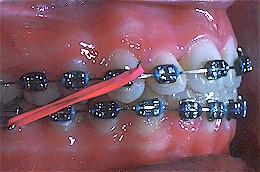 It is not unusual for elastics (a.k.a. rubber bands) to be prescribed as part of your orthodontic treatment when you are wearing braces. Your braces, which consist of brackets and wires, work by gently applying pressure to the teeth, and that pressure causes them to move into the correct position. In some cases, elastics are placed on your braces in strategic places in order to apply additional pressure.
It is not unusual for elastics (a.k.a. rubber bands) to be prescribed as part of your orthodontic treatment when you are wearing braces. Your braces, which consist of brackets and wires, work by gently applying pressure to the teeth, and that pressure causes them to move into the correct position. In some cases, elastics are placed on your braces in strategic places in order to apply additional pressure.
How Elastics Work
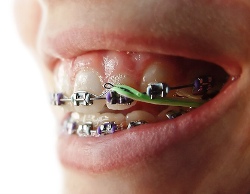 Customized for each patient, the elastics typically stretch over tiny loops on the top and bottom brackets. When worn as prescribed, these tiny elastics will apply the gentle and steady pressure needed to guide your teeth into the desired position and align one arch to the other. Without the use of these elastics, you may not be able to achieve the results you want, or you may have to wear braces for a longer period of time.
Customized for each patient, the elastics typically stretch over tiny loops on the top and bottom brackets. When worn as prescribed, these tiny elastics will apply the gentle and steady pressure needed to guide your teeth into the desired position and align one arch to the other. Without the use of these elastics, you may not be able to achieve the results you want, or you may have to wear braces for a longer period of time.
The Do's and Don'ts
Elastics must be worn as prescribed, and patient cooperation is essential to a successful outcome. Here's how you can do your part:
- DO - Change your elastics at least once a day. Remember to always wash your hands before removing and replacing the elastics;
- DON'T - Double up on elastics as this will cause too much pressure on the tooth or teeth and can actually harm the root of the tooth;
- DO - Get in the habit of carrying around an extra bag of elastics and replace them as soon as one breaks. By consistently wearing your elastics, you may shorten the overall time needed to wear braces;
- DON'T - Guess how they should be worn. If you are unsure where to place the elastics, call our office immediately so that we can help you get your elastics placed correctly;
- DO - Remove your elastics when eating and brushing your teeth, but remember to replace them when you are done.
- DON'T - Overstretch or overuse the same elastics or they will lose their strength and will be ineffective. You can avoid this by changing your elastics daily.
- DO - Call us immediately if you lose or run out of elastics. Please do not wait until your next regularly scheduled visit.
- DON'T - Forget to wear them consistently, as directed. By wearing your elastics exactly as prescribed, you will get better, faster, and more comfortable results. Generally, any discomfort from the elastics will disappear within a day or two, so hang in there.
- DO - Have fun with your braces and elastics. Elastics come in many different colors, so pick your favorite colors and show off your gorgeous smile!
Elastics are a key part of your orthodontic treatment, and learning how to remove and replace them correctly is an important part of your treatment. Before we send you on your journey to a happy, healthy smile, we'll make sure you understand all there is to know about taking care of your braces. Of course, if you have any questions about your orthodontic treatment, be sure to give the team at Bel Air Orthodontics a call.
. If you happen to forget to wear your elastics one day, don’t
double up the next
March 4th, 2015
 The American Association of Orthodontists wants to know What Makes You Smile and they’re inviting orthodontic patients everywhere to post a “Smiling Selfie” @ mylifemysmile.org.
The American Association of Orthodontists wants to know What Makes You Smile and they’re inviting orthodontic patients everywhere to post a “Smiling Selfie” @ mylifemysmile.org.
The American Association of Orthodontists’ (AAO) new and improved website now features a What Makes You Smile campaign. Their What Makes Me Smile gallery is a selfie collection showcasing the smiling faces of happy orthodontic patients around the world. If you’d like to submit your own selfie the process is simple. Here’s how it works:
Who Can Submit A Photo?
Patients who are currently in active treatment or who have completed orthodontic treatment are invited to take a smiling selfie and post it to the AAO's website at mylifemysmile.org. Patients under the age of 18 may participate, but must have the signature of their parent or guardian on the release form provided.
What Are The Photo Requirements?
- The AAO is looking for smiling photos that show your teeth and/or orthodontic appliances on your teeth, so show off your grin.
- The AAO will accept vertical, horizontal and/or square selfies. JPG files are preferred and images should range in file size from 100KB to 2MB.
- The AAO reserves the right to deny selfie submission due to poor photo quality or poor taste.
How Do I Upload My Selfie?
Simply visit the AAO’s What Makes Me Smile gallery and click on the Submit Your Photo link. From there, simply follow the steps provided to upload your image.
Submit Your What Makes Me Smile Quote
The American Association of Orthodontists wants to know What Makes You Smile. Maybe it’s your best friend, a favorite fishing spot, or a walk on the beach. Our patients are always smiling, so this should be the easiest part of the process.
Provide The Name Of Your Orthodontist
Before you hit the SUBMIT button, make sure you provide the name of your orthodontist (please use Stephen L. Godwin vs. Bel Air Orthodontics), along with the city and state where your treatment is provided. The AAO will use this information to verify that your orthodontist is a member of the American Association of Orthodontists. The AAO requires that your orthodontist be a member of the American Association of Orthodontists in order for you to participate.
If you are interested in being featured on the AAO's What Makes You Smile selfie gallery and need assistance, we can handle the process for you. Simply contact, Sherry Dillinger, our Professional Relations Coordinator, and she’ll lend you a hand. We're proud of the healthy, beautiful smiles we help create and we'd love to share them with the world.
Visit the AAO's What Makes Me Smile page to view the selfies posted by orthodontic patients everywhere. You can scroll through the images and read patient quotes by placing your cursor over the images. They're sure to make you smile!
AAO What Makes You Smile Release
February 24th, 2015
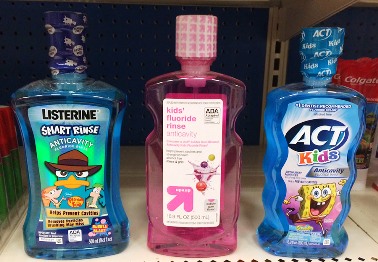 There are so many ways you can protect your teeth throughout your orthodontic treatment. We recommend you brush your teeth at least two times per day, floss regularly and protect your mouth and appliances from damage by making smart food choices. But did you know there is another, often forgotten, way to keep your teeth clean and healthy during your treatment? Fluoride, a mineral found in your water and many dental products can keep your teeth strong!
There are so many ways you can protect your teeth throughout your orthodontic treatment. We recommend you brush your teeth at least two times per day, floss regularly and protect your mouth and appliances from damage by making smart food choices. But did you know there is another, often forgotten, way to keep your teeth clean and healthy during your treatment? Fluoride, a mineral found in your water and many dental products can keep your teeth strong!
What is Fluoride And How is It Used?
Fluoride is a mineral that helps prevent cavities and tooth decay. It comes in two varieties: topical and systemic. Topical fluorides are applied directly to the tooth enamel. Some examples include fluoride toothpastes and mouth rinses, as well as fluoride treatments at your dentist's office. Systemic fluoride is swallowed and benefits the teeth before and after they erupt in the mouth. Examples include fluoridated water and dietary fluoride supplements.
The topical fluoride preparation used in the dental office is a much stronger concentration than that in toothpastes or mouth rinses that are available at your local pharmacy. A fluoride treatment typically takes just a few minutes. After the treatment, patients are asked not to rinse, eat or drink for at least 30 minutes in order to allow the teeth to absorb the fluoride. Your dentist may also prescribe a fluoride product such as fluoride gels or antibacterial mouth rinses. Dentists have used in-office fluoride treatments for decades to help protect their patients' oral health; so if you have questions about fluoride treatments and their benefits, don't hesitate to ask Dr. Godwin and/or your general dentist.
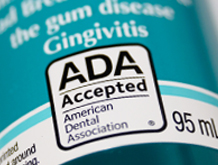 Look For The American Dental Association's Seal of Acceptance.
Look For The American Dental Association's Seal of Acceptance.
When choosing your own over-the-counter fluoride products, be sure to check for the American Dental Association's (ADA) seal of acceptance. Products marked with the ADA seal of approval have been examined carefully by the ADA's Council on Scientific Affairs and have met it's criteria for safety and effectiveness. Take care of your teeth and share your beautiful smile!
February 18th, 2015
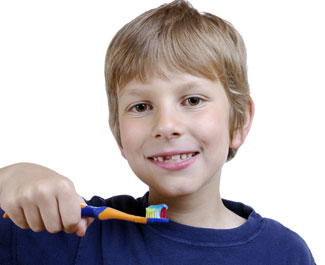 Has your toothbrush seen better days? No matter what type of toothbrush you use - electric or manual - when the bristles become frayed and worn, it is no longer effective for keeping your teeth and gums clean and healthy. The American Dental Association recommends you change your toothbrush every three months, and so do we! Also keep in mind that you should replace your toothbrush after an illness to avoid re-infection.
Has your toothbrush seen better days? No matter what type of toothbrush you use - electric or manual - when the bristles become frayed and worn, it is no longer effective for keeping your teeth and gums clean and healthy. The American Dental Association recommends you change your toothbrush every three months, and so do we! Also keep in mind that you should replace your toothbrush after an illness to avoid re-infection.
Choosing The Right Toothbrush
So which kind of toothbrush is right for you? Whether manual or electric, choose a toothbrush that is appropriate for your age and oral health needs.
Size: The head of the toothbrush should allow you easy access to all your teeth, especially those hard-to-reach molars. A toothbrush that is too large will be cumbersome to maneuver in a smaller mouth, while a toothbrush that is too small won't be as effective in reaching all the surface areas of your teeth.
Bristle Type: A soft-bristle toothbrush is your best bet to achieve a comfortable, safe, and effective teeth cleaning. Medium and hard-bristled brushes can damage your enamel and gums, especially if you tend to be an aggressive brusher.
Expert Recommendation: Make sure the toothbrush you choose has undergone rigorous safety and effectiveness testing. Look for the American Dental Association's (ADA) seal of approval or consult our team for recommendations on the best type of toothbrush to meet your needs, especially if you are wearing braces.
Technique: Finding the right toothbrush is the first step in great oral health. The second is ensuring that you're using the right brushing technique. Placing the toothbrush closer to the gum line and brushing with gentle circular motions for two minutes is important to achieve the best results.
Do you have questions about choosing the right toothbrush for your smile? If so, contact our office or ask us at your next appointment.
 It is not unusual for elastics (a.k.a. rubber bands) to be prescribed as part of your orthodontic treatment when you are wearing braces. Your braces, which consist of brackets and wires, work by gently applying pressure to the teeth, and that pressure causes them to move into the correct position. In some cases, elastics are placed on your braces in strategic places in order to apply additional pressure.
It is not unusual for elastics (a.k.a. rubber bands) to be prescribed as part of your orthodontic treatment when you are wearing braces. Your braces, which consist of brackets and wires, work by gently applying pressure to the teeth, and that pressure causes them to move into the correct position. In some cases, elastics are placed on your braces in strategic places in order to apply additional pressure. Customized for each patient, the elastics typically stretch over tiny loops on the top and bottom brackets. When worn as prescribed, these tiny elastics will apply the gentle and steady pressure needed to guide your teeth into the desired position and align one arch to the other. Without the use of these elastics, you may not be able to achieve the results you want, or you may have to wear braces for a longer period of time.
Customized for each patient, the elastics typically stretch over tiny loops on the top and bottom brackets. When worn as prescribed, these tiny elastics will apply the gentle and steady pressure needed to guide your teeth into the desired position and align one arch to the other. Without the use of these elastics, you may not be able to achieve the results you want, or you may have to wear braces for a longer period of time.



